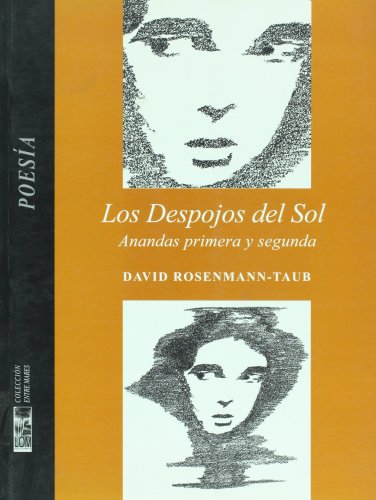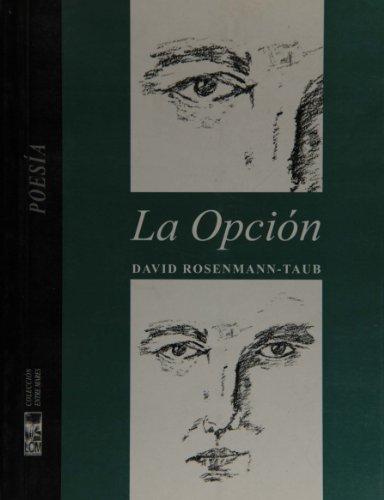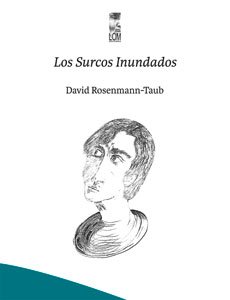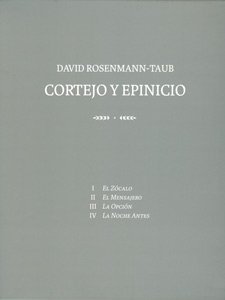Background
His precocious talent in both literature and music was recognized and encouraged by his father, a polyglot, and his mother, a virtuoso pianist.


(David Rosenmann-Taub concibe el vivir habitual como un es...)
David Rosenmann-Taub concibe el vivir habitual como un estar fuera un paseo sin regreso: un vivir (y un morir) sin enterarse . Los Despojos del Sol comienza con la ruptura: la conciencia se hace presente: el hombre se sabe. Lo experimentado, antes de saberse, existir; lo ahora experimentado, no existir....
http://www.amazon.com/gp/product/9562828107/?tag=2022091-20

(La Opción: un sí y un no: decisión e indecisión. Poner, a...)
La Opción: un sí y un no: decisión e indecisión. Poner, a la multitud que contenemos, de acuerdo. Una lucha no para ganar, para saber. Ser un fragmento de la consciencia del multiverso, y su socorro, ya que éste es, también, un fragmento. The Option: a yes and a no: decision and indecision. To make the multitude that we are come to an agreement. A fight, not to win, to know. To be a fragment of the consciousness of the multiverse, and its help, since it is, also, a fragment.
http://www.amazon.com/gp/product/9560002287/?tag=2022091-20

(Los desengaños y los entusiasmos, al confrontar el sucede...)
Los desengaños y los entusiasmos, al confrontar el suceder temporal: inundación de experiencias -hendeduras -. David Rosenmann-Taub posee una calidad y un acento totalmente excepcionales... Cuando la sinceridad está unida a la magia del arte, la impresión última que se recibe es la de la belleza. (Francis de Miomandre, Hommes et Monde). Una poesía absoluta, que no pretende sustituir a la vida, sino que es la vida; que no pretende describir el mundo, sino que es el mundo... En mi opinión, lo que mejor define a David Rosenmann-Taub es su condición de poeta total, es decir, que atiende a todos los aspectos de la realidad y que moviliza todos los recursos del lenguaje. (Eduardo Moga, Ínsula) The disillusionments and the enthusiasms, in confronting the fact of happening in time: a flood of experiences - fissures. David Rosenmann-Taub possesses a totally exceptional quality and tone... When sincerity is joined to the magic of art, the final impression that one receives of that of beauty. (Francis de Miomandre, Hommes et Monde). An absolute poetry, which does not attempt to substitute for life, but which is life; which does not attempt to describe the world, but is the world... In my opinion, what best defines David Rosenmann-Taub is his condition as total poet, that is to say, that he attends to every aspect of reality and deploys every resource of language. (Eduardo Moga, Ínsula)
http://www.amazon.com/gp/product/9560005634/?tag=2022091-20

(Esta caja contiene los cuatro volúmenes de la tetralogía ...)
Esta caja contiene los cuatro volúmenes de la tetralogía de David Rosenmann-Taub, Cortejo y Epinicio - El Zócalo, El Mensajero, La Opción, La Noche Antes. Los libros están disponibles, y se pueden leer, independientemente. Cortejo y Epinicio: la esencia de lo que es, para el hombre, vivir en la tierra, en un particular tiempo y espacio, desde su ahora hasta su adiós. La experiencia de una consciencia siempre joven y madura con sostenida energía. Un múltiple instante de lucidez: un extenso presente en un segundo intemporal. Nacimiento y agonía, amanecer y oscuridad. El triunfo de una derrota: un epinicio. This boxed set contains the four volumes of David Rosenmann-Taub's tetralogy Cortejo y Epinicio - El Zócalo, El Mensajero, La Opción, La Noche Antes. The books are available, and can be read, independently. Cortejo y Epinicio: the essence of what is, for man, to live on earth, in a particular time and space, from his now until his farewell. The experience of a consciousness, always young and mature, with sustained energy. A multiple instant of lucidity: an extended present in a timeless second. Birth and death, dawn and darkness. The triumph of a defeat: an epinicion.
http://www.amazon.com/gp/product/9560004190/?tag=2022091-20
His precocious talent in both literature and music was recognized and encouraged by his father, a polyglot, and his mother, a virtuoso pianist.
He later studied composition, counterpoint, and fugue with the celebrated composer Pedro Humberto Allende. He graduated from the University of Chile in 1948.
She began teaching him the instrument when he was two. By nine, he himself was giving piano lessons. He began writing poetry at a very early age.
His first published work, a long poem titled El Adolescente (“The Adolescent”), was written at age fourteen and appeared four years later in a literary magazine.
In the three decades that followed, Rosenmann-Taub published more than ten volumes of poetry, including Los Surcos Inundados (The Flooded Furrows), Louisiana Enredadera del Júbilo (The Vine of Jubilance), Los Despojos del Sol (The Spoils of the Sun), and El Cielo en la Fuente (The Sky in the Fountain). In 1976, he began to travel, lecturing on poetry, music, and aesthetics in Latin America, Europe, and the United States, where he settled in 1985.
His writings since that time are now being published in Chile, along with reissues of his older works. Maine incitó el espejo (2010), El horizonte cruza la casa (2011), Multiverso (2012), El duelo de la luz (2014).
That same year he won the Sindicato de Escritores prize for his first book of poetry, Cortejo y Epinicio (Cortege and Epinicion), which received a reputation-making review from the preeminent literary critic of Chile, Hernán Díaz Arrieta (known as “Alone”). Foreign Los Surcos Inundados, he received the Premio Municipal de Poesía, the Chilean equivalent of the Pulitzer Prize. Armando Uribe Arce, the recent winner of Chile’s Premio Nacional, described Rosenmann-Taub as “the most important and profound living poet of the entire Spanish language.”.
(Esta caja contiene los cuatro volúmenes de la tetralogía ...)
(David Rosenmann-Taub concibe el vivir habitual como un es...)
(Los desengaños y los entusiasmos, al confrontar el sucede...)
(El Mensajero addresses the essence of what it is for man ...)
(Bilingual anthology translated by Sabrina Costanzo)
(La Opción: un sí y un no: decisión e indecisión. Poner, a...)
